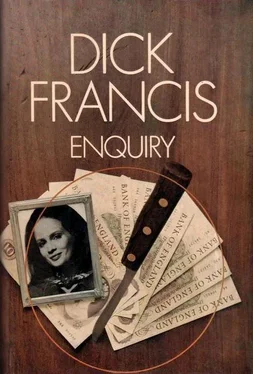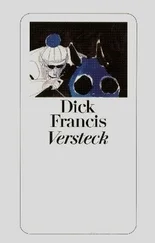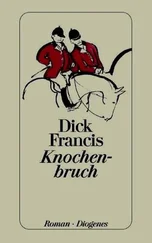I took the letter from her and read it myself. The words were quite clear: ‘the last race at Reading.’ Not the sixth race. The last race. And there had been seven races. It hadn’t been Carol or the Cannot Lie Co. who had made the mistake.
‘So you sent it?’
‘Of course. Off to the authorities, as per instructions.’ She put the letter back in the files. ‘Did you in, did it?’
‘Not that film, no.’
‘Alfie and the old man say you must have made a packet out of the Lemonfizz, to lose your licence over it.’
‘Do you think so too?’
‘Stands to reason. Everyone thinks so.’
‘Man in the street?’
‘Him too.’
‘Not a cent.’
‘You’re a nit, then,’ she said frankly. ‘Whatever did you do it for?’
‘I didn’t.’
‘Oh yeah?’ She gave me a knowing wink. ‘I suppose you have to say that, don’t you?’
‘Well,’ I said, handing her the Reading box to put back in the storeroom, ‘Thanks anyway.’ I gave her half a smile and went away across the expanse of mottled linoleum to the door out.
I drove home slowly, trying to think. Not a very profitable exercise. Brains seemed to have deteriorated into a mushy blankness.
There were several letters for me in the mailbox on my front door, including one from my parents. I unfolded it walking up the stairs, feeling as usual a million miles away from them on every level.
My mother had written the first half in her round regular handwriting on one side of a large piece of lined paper. As usual there wasn’t a full stop to be seen. She punctuated entirely with commas.
Dear Kelly,
Thanks for your note, we got it yesterday, we don’t like reading about you in the papers, I know you said you hadn’t done it son but no smoke without fire is what Mrs Jones the post office says, and it is not nice for us what people are saying about you round here, all airs and graces they say you are and pride goes before a fall and all that, well the pullets have started laying at last, we are painting your old room for Auntie Myfanwy who is coming to live here her arthritis is too bad for those stairs she has, well Kelly, I wish I could say we want you to come home but your Da is that angry and now Auntie Myfanwy needs the room anyway, well son, we never wanted you to go for a jockey, there was that nice job at the Townhall in Tenby you could have had, I don’t like to say it but you have disgraced us son, there’s horrid it is going into the village now, everyone whispering, your loving Mother.
I took a deep breath and turned the page over to receive the blast from my father. His writing was much like my mother’s as they had learned from the same teacher, but he had pressed so hard with his ballpoint that he had almost dug through the paper.
‘Kelly,
You’re a damned disgrace boy. It’s soft saying you didn’t do it. They wouldn’t of warned you off if you didn’t do it. Not lords and such. They know what’s right. You’re lucky you’re not here I would give you a proper belting. After all that scrimping your Ma did to let you go off to the University. And people said you would get too ladidah to speak to us, they were right. Still, this is worse, being a cheat. Don’t you come back here, your Ma’s that upset, what with that cat Mrs Jones saying things. It would be best to say don’t send us any more money into the bank. I asked the manager but he said only you can cancel a banker’s order so you’d better do it. Your Ma says it’s as bad as you being in prison, the disgrace and all.’
He hadn’t signed it. He wouldn’t know how to, we had so little affection for each other. He had despised me from childhood for liking school, and had mocked me unmercifully all the way to college. He showed his jolly side only to my two older brothers, who had had what he considered a healthy contempt for education: one of them had gone into the Merchant Navy and the other lived next door and worked alongside my father for the farmer who owned the cottages.
When in the end I had turned my back on all the years of learning and taken to racing my family had again all disapproved of me, though I guessed they would have been pleased enough if I’d chosen it all along. I’d wasted the country’s money, my father said; I wouldn’t have been given all those grants if they’d known that as soon as I was out I’d go racing. That was probably true. It was also true that since I’d been racing I’d paid enough in taxes to send several other farm boys through college on grants.
I put my parents’ letter under Rosalind’s photograph. Even she had been unable to reach their approval, because they thought I should have married a nice girl from my own sort of background, not the student daughter of a colonel.
They had rigid minds. It was doubtful now if they would ever be pleased with me, whatever I did. And if I got my licence back, as like as not they would think I had somehow cheated again.
You couldn’t take aspirins for that sort of pain. It stayed there, sticking in knives. Trying to escape it I went into the kitchen, to see if there was anything to eat. A tin of sardines, one egg, the dried up remains of some port salut.
Wrinkling my nose at that lot I transferred to the sitting-room and looked at the television programmes.
Nothing I wanted to see.
I slouched in the green velvet armchair and watched the evening slowly fade the colours into subtle greys. A certain amount of pace edged its way past the dragging gloom of the last four days. I wondered almost academically whether I would get my licence back before or after I stopped wincing at the way people looked at me, or spoke to me, or wrote about me. Probably the easiest course would be to stay out of sight, hiding myself away.
Like I was hiding away at that minute, by not going to the Jockeys’ Fund dance.
The tickets were on the mantel. Tickets for Tony and Poppy, and for me and the partner I hadn’t got around to inviting. Tickets which were not going to be used, which I had paid twelve fund raising guineas for.
I sat in the dark for half an hour thinking about the people who would be at the Jockeys’ Fund dance.
Then I put on my black tie and went to it.
I went prepared to be stared at.
I was stared at.
Also pointed out and commented on. Discreetly, however, for the most part. And only two people decisively turned their backs.
The Jockeys’ Fund dance glittered as usual with titles, diamonds, champagne and talent. Later it might curl round the edges into spilled drinks, glassy eyes, raddled make-up and slurring voices, but the gloss wouldn’t entirely disappear. It never did. The Jockeys’ Fund dance was one of the great social events of the steeplechasing year.
I handed over my ticket and walked along the wide passage to where the lights were low, the music hot, and the air thick with smoke and scent. The opulent ballroom of the Royal County Hotel, along the road from Ascot racecourse.
Around the dancing area there were numbers of large circular tables with chairs for ten or twelve round each, most of them occupied already. According to the chart in the hall, at table number thirty-two I would find the places reserved for Tony and me, if in fact they were still reserved. I gave up looking for table thirty-two less than half way down the room because whenever I moved a new battery of curious eyes swivelled my way. A lot of people raised a hello but none of them could hide their slightly shocked surprise. It was every bit as bad as I’d feared.
A voice behind me said incredulously, ‘Hughes!’
I knew the voice. I turned round with an equal sense of the unexpected. Roberta Cranfield. Wearing a honey-coloured silk dress with the top smothered in pearls and gold thread and her copper hair drawn high with a trickle of ringlets down the back of her neck.
Читать дальше












